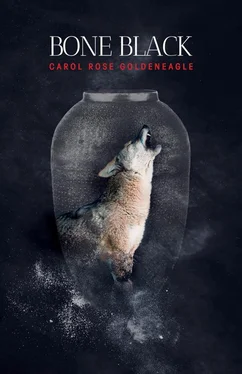While Lord continues to inspect and admire her new pottery pieces, Wren leaves for the farmhouse to retrieve their espresso machine. “I’ll bring it out here so we can both enjoy a couple of cappuccinos.”
“Sounds great,” Lord agrees. “I’ll continue packing up these pieces. You are going to have a spectacular show.”
Wren feels guilt at the thought of keeping secrets from her husband, but decides to push all concerns out of her mind and commit to enjoying this day with Lord, free from harm, free from worry, free from sin. She whispers a prayer, barely audible, as she walks toward the front door.
Wren has never been much of a churchgoer, though she attends every once in a while on special occasions, so she feels no guilt about hosting the opening of her new exhibit on a Sunday. The past couple of weeks, she’s been giving all her thoughts and efforts into her pottery.
What is occupying her now is unpacking the cardboard boxes filled with new work. Lord is helping her unload both her car and his own vehicle, carrying the heavy packages up a flight of stairs and into the spacious gallery. It’s an excellent day for a show. There is no wind, no clouds in the sky, with the only sounds across the prairie being the many vehicles out and about. Wren hopes the drivers see the sandwich board she’s placed out on the road, inviting everyone to come and visit this afternoon.
She says a silent prayer that her exhibit will be well-attended and gives thanks that lately, she seems to be more at peace now that her veil of sadness has been partially lifted. She offers her prayer upward and thinks about the acts she’s recently undertaken. She has always figured that if a person is truly contrite or filled with sorrow about harmful acts they’ve committed, God already knows.
Wren doesn’t feel the need to go to confession in these moments. To her, making an admission during confession seems more like talking to a counsellor or therapist. Wren isn’t convinced that that type admission of guilt is necessary for her. She has rationalized that remorse, or even forgiveness, isn’t needed given what those men did. She feels no remorse for ridding the world of hateful and damaged men, men who treated women like throw-away objects.
The stories of their demise are etched on some of the new pieces she’s unveiling today. Those stories could so easily be deciphered by anyone knowing what to look for in the petroglyph designs decorating her bone black pottery. On an abstract mask, there is an image of a fish in the place of a mouth. Another piece, a heavy coffee mug, is decorated with a string of hand-painted pearls. It takes Wren, Lord and the gallery curator about three hours to set up all the pottery. Some pieces are hanging on the wall; others are displayed in cases. Wren has created dozens.
Just as they finish, there is the sound of footsteps outside. Next, the faint sound of a doorbell, signalling someone is entering the building. The curator greets the visitors, telling them to help themselves to some cookies, crackers and cheese that she’s carefully set out in the lobby. “Here are some napkins, and there is coffee or tea in the corner if you like. Help yourself and enjoy while you look around.” She gestures towards the main gallery area.
The guests are a mother and her daughter, out visiting in the valley for the day. They saw the sign out on the highway and decided to come in and have a look. “Oh Mom, you have to come take a look at this. I love it,” exclaims the daughter. She tells Wren that her older sister is getting married in the spring. “We totally have to buy this for her, Mom.”
“Oh, it’s perfect,” the mother replies. “And so different from other pottery we’ve been looking at.” The girl and her mother admire the bone-black finish on their new wine decanter. Wren has painted images of the lake where that red truck belonging to the roofer is now permanently parked.
Lord stays the afternoon to help Wren with the opening, which is a good thing. Within the hour, he’s the one looking after the cash box as Wren explains her new designs to the admiring public. (Well, a partial explanation—she’ll never tell anyone where she got the bones for the bone black finish.)
“My love,” Lord says during a quiet lull in crowd activity, “whatever you have been doing, you’ll have to keep doing it. People love this work.”
It’s been such a great couple of weeks that Wren hasn’t given any thought to Myron Salt and the story she heard on the news the day she picked up Lord at the airport. But now, as she watches visitors fussing over her new style of pottery, she promises Lord that she’ll find a way to make more of the same. After all, she knows exactly where she’ll get new material.
Lord’s time at home was lovely, but business calls sooner than later. Lord must make another trip to Manitoba, driving out today. Wren will be alone with her thoughts again, thoughts of scorn and revenge towards those who cause harm but are never called to answer, who never face responsibility for what they’ve done. Maybe she would have tried stopping, but without realizing he’d done so, Lord has encouraged her. Whatever you’ve been doing, keep doing it , he’d said. Words that ring in her thoughts now.
Wren has tracked Myron’s routine to a place called Scoundrels, a local watering hole that used to be frequented by many in Regina’s north end before the freeway was constructed. It used to be a place where respectable people might pop in for a drink after work, but not anymore. Pasqua Street has become almost silent unless you listen for slurred and hushed whispers from the Scoundrels parking lot. Now, low-lifes hang out in dingy, sticky booths. Dank with despair, it’s a place where dreams come to die, a place where all who visit seem to have abandoned their decency. Myron is one of them.
Wren parks her car in a parking lot with a falling-down fence tagged with graffiti and a garbage bin overflowing with debris. She sees a ragged scarecrow displayed in the front yard belonging to an area resident, across the street from the bar. That damn scarecrow. Wren hasn’t seen it lately in her dreams, but now there is one staring at her. The face of doom.
As she sits in the car staring at the scarecrow, Wren wonders if the smallpox epidemic that used to exist throughout the land now exists within people’s minds, eating away at everything sacred and good. Wren decides then and there to see her actions tonight as eliminating the effects of this plague.
Wren has been following Myron for the past couple of days, the same way any good hunter pursues an animal. Myron has not been difficult to track. He comes from a prominent and well-known family that owns a chain of prosperous restaurants in each of the province’s major cities. The family contributes to a charity that allows the less fortunate to send their kids to music lessons, take part in sporting activities or buy gifts at Christmas time.
Admirable generosity, but local folklore has it that the family accumulated its wealth after winning a high-stakes bet in a basement poker game, right here at Scoundrels. Whether or not it is true, there are still whispers that if you borrow money from the family and it can’t be repaid, there will be big trouble. Rumour has it that on more than one occasion, a borrower has had to pay with a property deed.
The Salt family reeks of white privilege: a general advantage that makes it easier for them to cheat anyone out of what is rightfully theirs and get away with it. They just take what they want. Myron was represented by a skilled and expensive lawyer up against an overworked public defender. At the trial, grainy footage showed images of someone who could have been Mavis getting into a grey pickup at a gas station near the outskirts of town. The footage indicated some type of specialty bodywork on the back bumper of the truck—a painting of a yellow honeybee flipping the bird. In the end, the footage was inadmissible because neither the person nor the bodywork was clear enough for a positive ID. This lack of forensic evidence and no eyewitnesses ensured Myron’s acquittal. After he was charged, the bee was removed and the truck repainted a dark shade of grey. The Crown requested records of bodywork from the family’s own autobody repair shop, but none came up. Family sticks together.
Читать дальше












